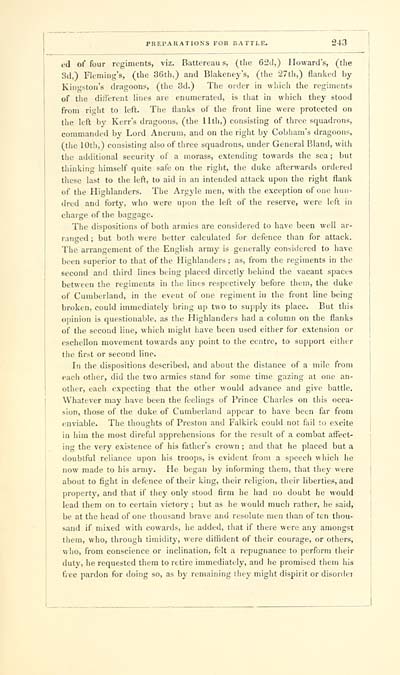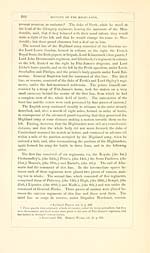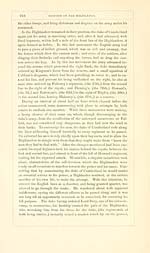Download files
Complete book:
Individual page:
Thumbnail gallery: Grid view | List view

PREPARATIONS FOR BATTLE. 243
ed of four regiments, viz. Battereau s, (the 62(J,) Howard's, (the
3tl,) Fleming's, (the 36th,) ajid Blakeney's, (the 27th,) flanlved by
Kingston's dragoon?, (the 3d.) The order in which the regimonts
of the diHerent lines are enumerated, is that in which they stood
from right to left. The Hanks of the front line were protected on
tiie left by Kerr's dragoons, (the lltli,) consisting of three squadrons,
commanded by Lord Ancrum, and on tlie right by Cobhum's dragoons,
(the 10th,) consisting also of three squadrons, under General Bland, with
the additional security of a morass, extending towards the sea ; but
thinking himself quite safe on the right, the duke afterwards ordered
these last to the left, to aid in an intended attack upon the right flank
of the Highlanders. The Argyle men, with the exception of one hun-
dred and forty, who were upon the left of the reserve, were left in
charge of the baggage.
The dispositions of both armies are considered to have been well ar-
ranged ; but both were better calculated for defence than for attack.
The arrangement of the English army is generally considered to have
been superior to that of the Highlanders ; as, from the regiments in the
second and third lines being placed directly behind the vacant spaces
between the regiments in the lines respectively before them, the duke
of Cumberland, in the event of one regiment in the front line being
broken, could immediately bring up two to supply its place. But this
opinion is questionable, as the Highlanders had a column on the flanks
of the second line, which might have been used either for extension or
eschellon movement towards any point to the centre, to support either
the first or second line.
In the dispositions described, and about the distance of a mile from
each other, did the two armies stand for some time gazing at one an-
other, each expecting that the other would advance and give battle.
Whatever may have been the feelings uf Prince Charles on this occa-
sion, those of the duke of Cumberland appear to have been far from
enviable. The thoughts of Preston and Falkirk could not fail !o excite
in him the most direful apprehensions for the result of a combat aff'ect-
ing the very existence of his father's crown ; and that he placed but a
doubtful reliance upon his troops, is evident from a speech which he
now made to his army. He began by informing them, that they were
about to fight in defence of their king, their religion, their liberties, and
property, and that if they only stood firm he had no doubt he would
lead them on to certain victory ; but as he would much rather, he said,
be at the head of one thousand brave and resolute men than of ten thou-
sand if mixed with cowards, he added, that if there were any amongst
them, who, through timidity, were diffident of their courage, or others,
who, from conscience or inclination, felt a repugnance to perform their
duty, he requested them to retire immediately, and he promised them his
free pardon for doing so, as by remaining they might dispirit or disordei
ed of four regiments, viz. Battereau s, (the 62(J,) Howard's, (the
3tl,) Fleming's, (the 36th,) ajid Blakeney's, (the 27th,) flanlved by
Kingston's dragoon?, (the 3d.) The order in which the regimonts
of the diHerent lines are enumerated, is that in which they stood
from right to left. The Hanks of the front line were protected on
tiie left by Kerr's dragoons, (the lltli,) consisting of three squadrons,
commanded by Lord Ancrum, and on tlie right by Cobhum's dragoons,
(the 10th,) consisting also of three squadrons, under General Bland, with
the additional security of a morass, extending towards the sea ; but
thinking himself quite safe on the right, the duke afterwards ordered
these last to the left, to aid in an intended attack upon the right flank
of the Highlanders. The Argyle men, with the exception of one hun-
dred and forty, who were upon the left of the reserve, were left in
charge of the baggage.
The dispositions of both armies are considered to have been well ar-
ranged ; but both were better calculated for defence than for attack.
The arrangement of the English army is generally considered to have
been superior to that of the Highlanders ; as, from the regiments in the
second and third lines being placed directly behind the vacant spaces
between the regiments in the lines respectively before them, the duke
of Cumberland, in the event of one regiment in the front line being
broken, could immediately bring up two to supply its place. But this
opinion is questionable, as the Highlanders had a column on the flanks
of the second line, which might have been used either for extension or
eschellon movement towards any point to the centre, to support either
the first or second line.
In the dispositions described, and about the distance of a mile from
each other, did the two armies stand for some time gazing at one an-
other, each expecting that the other would advance and give battle.
Whatever may have been the feelings uf Prince Charles on this occa-
sion, those of the duke of Cumberland appear to have been far from
enviable. The thoughts of Preston and Falkirk could not fail !o excite
in him the most direful apprehensions for the result of a combat aff'ect-
ing the very existence of his father's crown ; and that he placed but a
doubtful reliance upon his troops, is evident from a speech which he
now made to his army. He began by informing them, that they were
about to fight in defence of their king, their religion, their liberties, and
property, and that if they only stood firm he had no doubt he would
lead them on to certain victory ; but as he would much rather, he said,
be at the head of one thousand brave and resolute men than of ten thou-
sand if mixed with cowards, he added, that if there were any amongst
them, who, through timidity, were diffident of their courage, or others,
who, from conscience or inclination, felt a repugnance to perform their
duty, he requested them to retire immediately, and he promised them his
free pardon for doing so, as by remaining they might dispirit or disordei
Set display mode to: Large image | Transcription
Images and transcriptions on this page, including medium image downloads, may be used under the Creative Commons Attribution 4.0 International Licence unless otherwise stated. ![]()
| Early Gaelic Book Collections > Ossian Collection > History of the Highlands and of the Highland clans > Volume 3 > (277) |
|---|
| Permanent URL | https://digital.nls.uk/79655746 |
|---|
| Description | Vol. III. |
|---|---|
| Shelfmark | Oss.249 |
| Attribution and copyright: |
|
| Description | Selected books from the Ossian Collection of 327 volumes, originally assembled by J. Norman Methven of Perth. Different editions and translations of James MacPherson's epic poem 'Ossian', some with a map of the 'Kingdom of Connor'. Also secondary material relating to Ossianic poetry and the Ossian controversy. |
|---|
| Description | Selected items from five 'Special and Named Printed Collections'. Includes books in Gaelic and other Celtic languages, works about the Gaels, their languages, literature, culture and history. |
|---|

